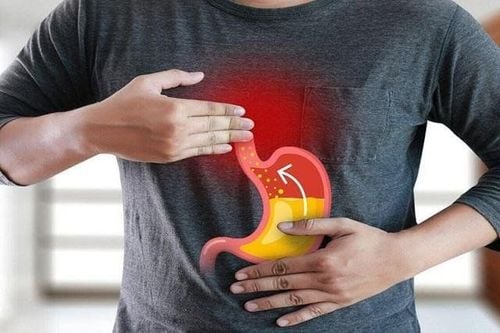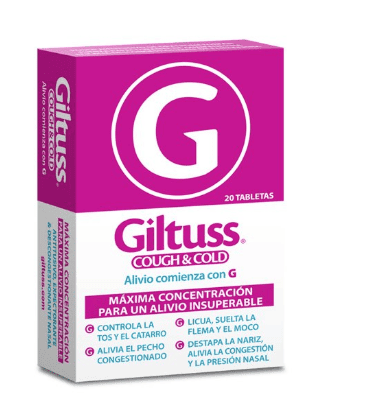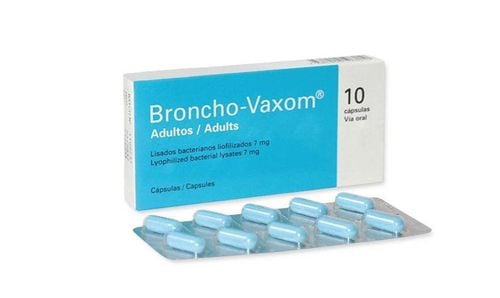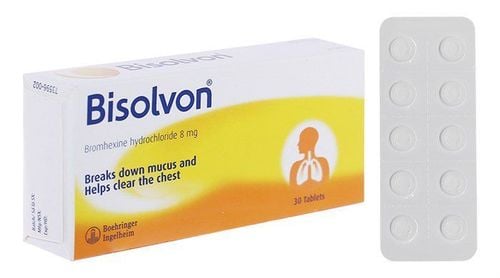This is an automatically translated article.
Cough is a conditioned reflex of the body to eliminate agents that affect the body and it can be a sign that you are suffering from a certain disease. We will learn about the causes of cough in the article below.
1. Polluted Air Air contains certain components contaminated by chemicals such as sulfur dioxide or nitric oxide that can cause a cough reaction when a patient is exposed to them. In addition, molds and dust in our own homes are also a cause of cough.
To prevent this, you can use a special filter on your air conditioner or wear a mask when you are outdoors or when going to places with a lot of dust.
2. Cold The patient has a cold caused by a virus that enters your mouth, eyes, or nose from airborne droplets. You can become infected or pass it on to others when you cough, sneeze, or touch contaminated surfaces such as doorknobs or furniture. In addition to a runny nose and sneezing, a cold can also enter your airways and irritate your body, triggering the cough reflex. This symptom usually resolves after a week or so. Therefore, you should see a doctor if the illness is severe or lasts for 2 weeks or more.
3. Flu Like a cold, the flu virus attacks the throat, nose, and lungs. We are at risk of getting sick when an infected person sneezes or coughs into the surrounding air or touches an object. In most cases, the symptoms of a cold will be more severe than a cold. In addition, you are more likely to have a high fever and chills but less likely to cause sneezing and runny nose. Sneezing and coughing are more common with a cold.

Cảm lạnh là một trong những nguyên nhân gây ho
4. Postnasal drip When the body makes too much mucus, it runs down the back of the throat and can cause coughing. The causes of this condition are varied and are mainly due to infection or allergies. Treatment will depend on the cause. For example, if you have an infection, your doctor may prescribe antibiotics or allergies that can be controlled with lifestyle changes or medication.
5. Asthma Asthma occurs when the airways narrow and swell, triggering a cough response. An asthma flare-up can be caused by pollen, dust, smoke, exercise, cold air, the common cold, and even stress. Your doctor will help you recognize and prevent triggers, and prescribe medicine to help prevent an asthma attack and an inhaler when an asthma flare-up occurs.
6. Acute bronchitis Infection of the pharynx-nose-lung area makes the bronchial tubes inflamed, blocking the passage of air from the outside to the lungs. Coughs will last for days and may be accompanied by colored, thick mucus for several weeks. If your symptoms don't get better, or if they keep coming back, you may have another problem and need to see your doctor.
7. Gastroesophageal reflux This is a phenomenon in which stomach acid mixes with food and backs up into the throat, stimulating the digestive tract, causing dry coughs. This condition can be controlled with lifestyle changes and over-the-counter medications. However, in severe cases, prescription medication or surgery may be necessary.
8. Pneumonia When bacteria, viruses or fungi enter the lungs, it causes the air sacs inside to fill with fluid or pus leading to coughs with thick phlegm. Some symptoms may include fever, chills, and difficulty breathing. Treatments may include antibiotics in the case of bacterial pneumonia, cough medicine, and fever-reducing pain relievers.
9. Chronic Obstructive Pulmonary Disease (COPD) This is a collection of different diseases including emphysema and chronic bronchitis that causes breathing problems. The small air sacs in the lungs are damaged or irritated, making it difficult for air to flow. Treatment depends on the cause, but your doctor may give you medication and recommend lifestyle changes such as not smoking.

Trào ngược dạ dày thực quản là nguyên nhân gây ho
10. Whooping cough This is a bacterial infection and is accompanied by a dry cough. The name is derived from the "creak" sound when trying to take a deep breath between coughing spells. Currently most of us have been vaccinated against whooping cough, but we need to get a booster shot after a while to ensure effective prevention.
11. Medication use ACE inhibitors used to treat high blood pressure have a cough as a side effect, with 1 in 5 people having a cough. If this happens to you, you need to tell your doctor right away so that you can switch to another more suitable medication.
12. Heart failure You may develop coughs accompanied by white or pink foamy mucus. That's when narrowed arteries, high blood pressure, or another condition prevent your heart from pumping blood as strongly as it should. Medication and lifestyle changes such as exercising, improving your diet, or losing weight will help.
13. Lung cancer Coughs, especially coughing up blood are warning signs of lung cancer. More noticeable if the cough is accompanied by chest pain, fatigue, weight loss, wheezing, and shortness of breath. Lung cancer treatments can include radiation therapy, chemotherapy, and surgery.
Above are the causes of a noticeable cough that we need to pay attention to because it can be a warning sign that your body is having a problem. When there is a persistent cough accompanied by other unusual changes, you need to immediately go to a medical facility for a timely examination and diagnosis.
Please dial HOTLINE for more information or register for an appointment HERE. Download MyVinmec app to make appointments faster and to manage your bookings easily.
Reference source: webmd.com













